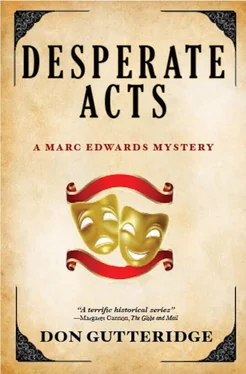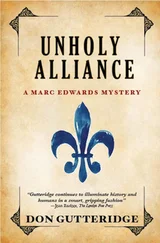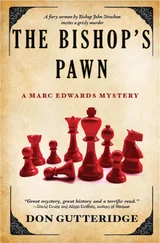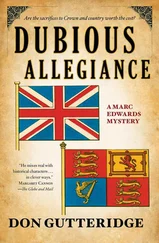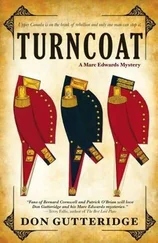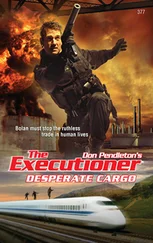Don Gutteridge - Desperate Acts
Здесь есть возможность читать онлайн «Don Gutteridge - Desperate Acts» весь текст электронной книги совершенно бесплатно (целиком полную версию без сокращений). В некоторых случаях можно слушать аудио, скачать через торрент в формате fb2 и присутствует краткое содержание. Год выпуска: 0101, Издательство: Bev Editions, Жанр: Исторический детектив, на английском языке. Описание произведения, (предисловие) а так же отзывы посетителей доступны на портале библиотеки ЛибКат.
- Название:Desperate Acts
- Автор:
- Издательство:Bev Editions
- Жанр:
- Год:0101
- ISBN:нет данных
- Рейтинг книги:4 / 5. Голосов: 1
-
Избранное:Добавить в избранное
- Отзывы:
-
Ваша оценка:
- 80
- 1
- 2
- 3
- 4
- 5
Desperate Acts: краткое содержание, описание и аннотация
Предлагаем к чтению аннотацию, описание, краткое содержание или предисловие (зависит от того, что написал сам автор книги «Desperate Acts»). Если вы не нашли необходимую информацию о книге — напишите в комментариях, мы постараемся отыскать её.
Desperate Acts — читать онлайн бесплатно полную книгу (весь текст) целиком
Ниже представлен текст книги, разбитый по страницам. Система сохранения места последней прочитанной страницы, позволяет с удобством читать онлайн бесплатно книгу «Desperate Acts», без необходимости каждый раз заново искать на чём Вы остановились. Поставьте закладку, и сможете в любой момент перейти на страницу, на которой закончили чтение.
Интервал:
Закладка:
Thus it was close to nine o’clock when thegroup finally settled down around the long table to entertain thequestion of the week. Self-conscious about his youth and his NewYork twang among these British gentlemen, Brodie had spent much ofhis time so far listening and observing. He realized, and acceptedthe fact, that only the sponsorship of Horace Fullarton, his seniorat the Commercial Bank, had allowed him entry into this exclusiveclub of middle-aged gentlemen. Although Marc Edwards and others -after the scandal and tragedy of last March – had done their bestto disabuse the better classes of Toronto of their misguidedopinion of Brodie’s deceased guardian, the taint of Dougherty’ssupposed “sins” still clung to his wards. And, Brodie told himself,a desire to re-establish the good name of Dougherty – and, byassociation, Langford – had been the prime motive for his acceptingMr. Fullarton’s offer to join this club.
“Gentlemen, I trust our little stage-play,with its truly dramatic climax, has put you all in the proper frameof mind for discussing this evening’s question, the meat of whichis: When, if ever, is it right to overthrow a legitimate ruler, asBrutus did Caesar?” Sir Peregrine smiled his most ingratiatingsmile, bringing all of his jowls into action and inducing a flushacross the vast expanse of his hairless head. “And, as you wereperusing the text in preparation, I trust also that you reflectedupon what the Great Versifier himself is telling us about theissue.”
There was an awkward silence, broken only bythe drumming of Sir Peregrine’s plump, effeminate fingers on thetable-top. As the chairman waited impatiently for someone to leapinto the fray, Brodie recalled what Mr. Fullarton had told himabout this portly caricature of an English nobleman. Shuttleworth,it was said, had inherited, at the tender age of twenty-five, athriving cotton mill from his ruthless father and, having been bredand raised to be the first true gentleman in the family, had hadthe good sense to let the business run itself. His onlycontribution to its success was a suggestion that they concentrateon producing stockings for Wellington’s army in its long fightagainst Napoleon. For such “meritorious service to King andcountry,” Shuttleworth had been made a baronet and his wife,Madeleine, by proxy, a lady. Their arrival here on the outskirts ofempire, however, had not been part of the Shuttleworth march todestiny’s beat. Fate took a hand in that. Lady Madeleine’s sisterhad emigrated to Upper Canada with her husband, who became wealthyspeculating in land transactions and hobnobbing with those whomattered. But the fellow had been irresponsible enough to squandermuch of his fortune and then die under a falling tree whilesupervising the clearance of a prime lot – leaving a wife and sixchildren with little money and a half-constructed mansion. Havingworn out their welcome on the fringes of London society, theShuttleworths made the magnanimous decision to sell off thenettlesome business, pack up their accumulated trinkets, and sailfor the New World. Arriving only last July, they had managed tocomplete the construction of Oakwood Manor in one of the park lotsup on Sherbourne Street north, with a generous (albeit separate)wing provided for the widow and her destitute brood.
“Is that a sheet of notes I spy before you,Mr. Dutton?” Sir Peregrine said helpfully.
Andrew Dutton, a retired attorney, glanced upwarily from under his flared brows, gave his trimmed goatee severalnervous strokes, cleared his throat and said, “Not on the topic perse, Sir Peregrine – just a list of key personages. The memory,which used to be as sharp as a tack, has begun to lose its edge -or is it point?”
When, despite an indulgent smile ofencouragement from the chairman, Dutton offered no furtherelucidating comment, Sir Peregrine said with a failed attempt atlight-heartedness, “Surely such a topic, so ably and dramaticallyrepresented by the play, should be of interest to a colony thatitself has experienced some sort of minor coup d’état ?”
“I think that very fact may have occasionedour unusual reticence,” said Cyrus Crenshaw from his seat at thefar end of the table, facing the chairman. “You see, the woundsfrom our recent farmers’ revolt have not had time to heal.”
“Ah, just so,” Sir Peregrine replied – not,in his almost total ignorance of things colonial, really seeing thepoint.
“But perhaps I may move the discussionforward by saying that in my considered opinion the nub of theissue concerning tyrannicide is whether the purported tyrant is,first of all, a tyrant in fact, and then whether or not he is thelegitimate head of state.”
As Brodie had noted in earlier meetings,Cyrus Crenshaw spoke in a deliberate and overly formal manner, asif his vocabulary and sentence rhythms had been acquired late inlife and meticulously overlaid. He was the owner of a prosperingcandle-factory up on Lot Street and the occupant of a fine housenearby. A previous lieutenant-governor, Sir John Colborne, had madehim a permanent member of the Legislative Council, the colony’sso-called Upper House.
“I agree whole-heartedly,” said HoraceFullarton, sitting beside Brodie. “We must consider the fact thatCaesar crossed the Rubicon and made himself ruler of Rome, using,of course, the usual excuse of bringing order out of chaos andpreventing civil war.”
Brodie was pleased to see his mentor – atall, handsome, nattily dressed man of forty years – join thediscussion with obvious relish. While a natural banker – in hisrectitude, his impeccable manners, and his instinct for makingmoney – he seemed to have paid a heavy price for his success andhis public standing. Away from the bank and in casual settings,Brodie found him to have a sense of humour and a personality thatcraved company and social interaction. But a lifetime of “mindinghis Ps and Qs” had apparently made it difficult for him to “letgo.” His day-to-day existence was further constrained by the factthat his wife Bernice had been an invalid for ten years and had notbeen able to bless him with children. That he treated Brodie like ason was both understandable, and welcomed.
“And just because he placed a crown on hisown head does not make him a tyrant,” Phineas Burke, the hawk-nosedstationer said. “We’re given only the conspirators’ opinion ofCaesar. And their motives, Brutus excluded, are suspect, aren’tthey?”
“Very good points,” enthused SirPeregrine.
“I wasn’t particularly fond of that MartellusTimber,” Dutton said.
“And how can we forget that our own rebels,just two years ago, used the same false reasoning to justify theiractions,” Crenshaw said. “They claimed that Governor Head hadusurped the election of 1836 and had acted arbitrarily against theexpress wishes of the Colonial Secretary in London. And theysuggested that the province was drifting into chaos and certainruin.”
“But Francis Head was the King’s surrogatehere, was he not?” said Dr. Samuel Pogue, physician and unsolicitedadvisor to successive lieutenant-governors. “To threaten him was tothreaten the Crown itself.”
“I shudder to think on it,” Sir Peregrineadded.
“But is the state not something larger thanthe monarchy?” Dutton chipped in, his lawyer’s mettle having beenwhetted. “Is not Britain bigger than any single king or queen?”
“Surely the monarch is the state,” SirPeregrine said hastily, alarmed that the discussion was plummetingfrom the lofty altar of Bardic idolatry.
“Tell that to King Charles,” said EzraMichaels, King Street chemist and staunch supporter of the OrangeLodge and its obsession with all things monarchical.
“Gentlemen, gentlemen. Could we not bring thedebate back to Mr. Shakespeare’s glorious play?”
But the ferret was out of its box.
Читать дальшеИнтервал:
Закладка:
Похожие книги на «Desperate Acts»
Представляем Вашему вниманию похожие книги на «Desperate Acts» списком для выбора. Мы отобрали схожую по названию и смыслу литературу в надежде предоставить читателям больше вариантов отыскать новые, интересные, ещё непрочитанные произведения.
Обсуждение, отзывы о книге «Desperate Acts» и просто собственные мнения читателей. Оставьте ваши комментарии, напишите, что Вы думаете о произведении, его смысле или главных героях. Укажите что конкретно понравилось, а что нет, и почему Вы так считаете.
